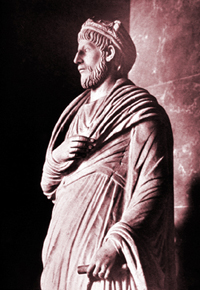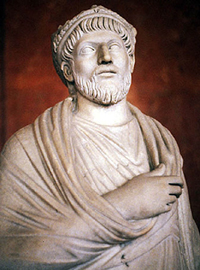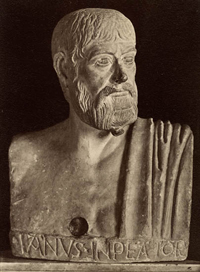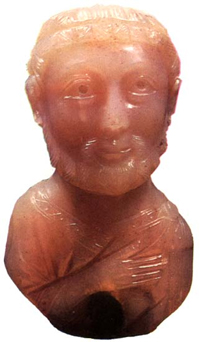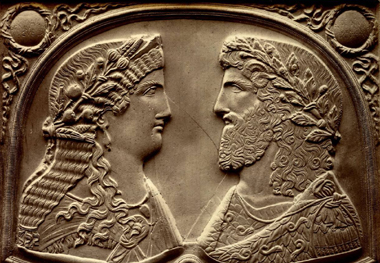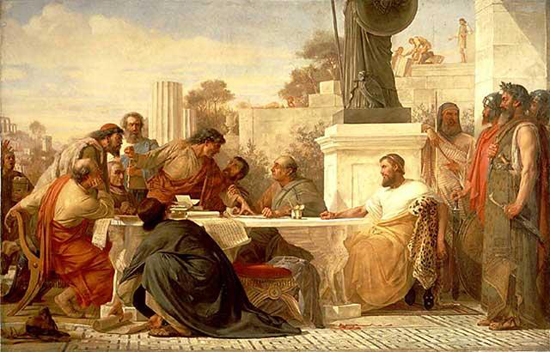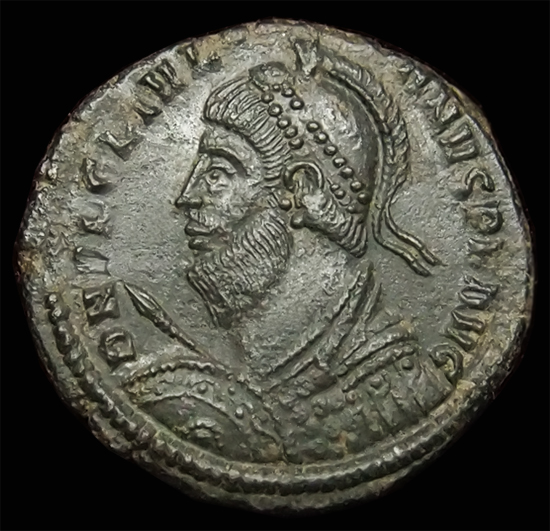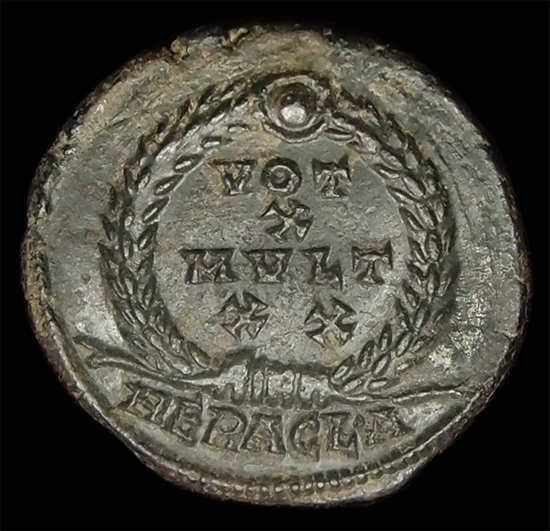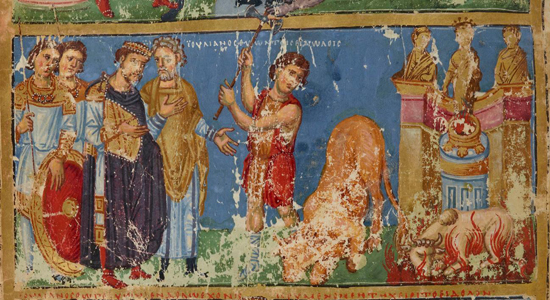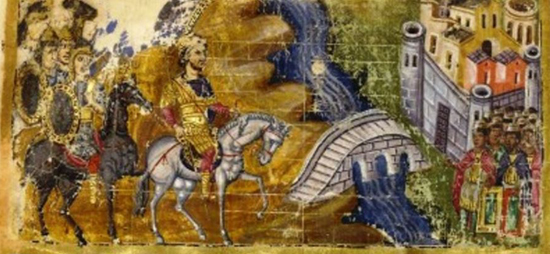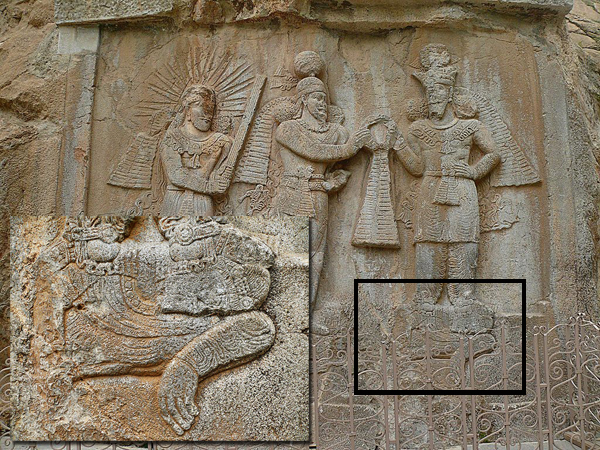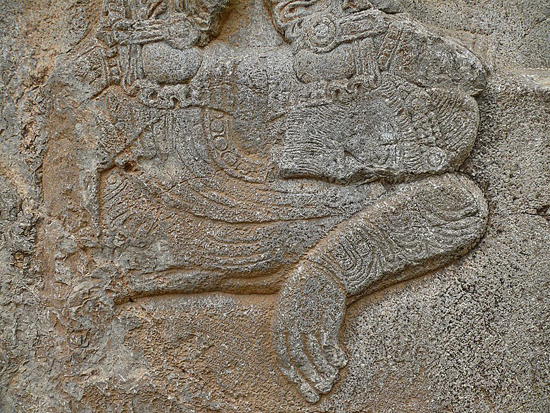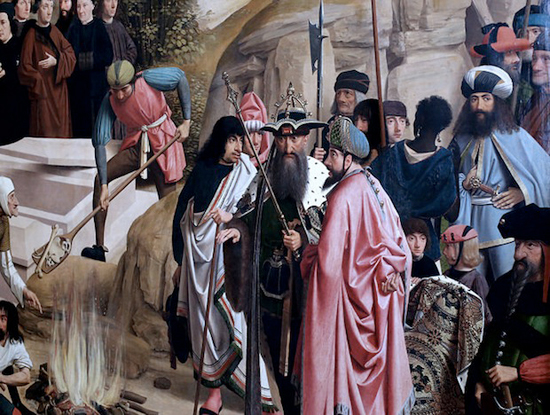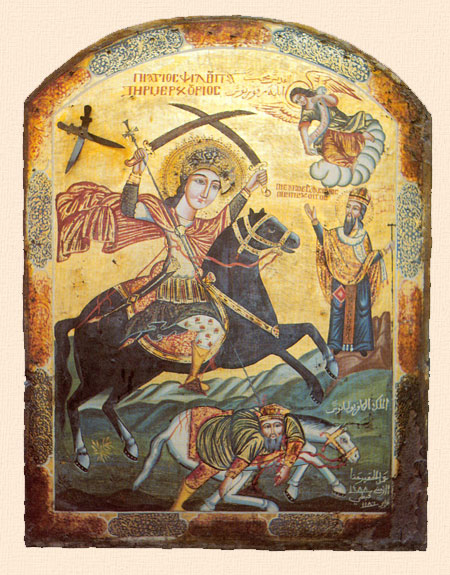
AE3 - IMP JULIAN - (361-363 AD)
(RIC 106A)
- Heraclea Mint
Flavius Claudius Julianus
Born: 331/332
Caesar: A.D. 361-363
Obverse: Portrait helmeted, cuirassed bust left with shield and spear - DN FL CL IVLIANVS PF AVG
Reverse: Wreath - VOT X MVLT XX - HERACL•A
The Works of Julian Mispogon (Beard Hater): Satirical work addressed to the people of Antioch in answer to their irreverence and ridicule of him. The Caesars (Symposium / Kronia): Comic work composed by Julian on the occasion of the Saturnalia in which Julius Caesar, Alexander the Great, and past emperors are judged by the gods as to who of them is the greatest. Against the Galilaeans: Surviving fragments of a scathing polemic against Christianity. Taken from the Contra Julianum by Cyril of Alexandria. Here Julian characterizes Christianity as fraudulent while praising Hellenists and paying respect to the Hebrews.
|
Inscriptions: D(ominus) N(oster) FL(avius) CL(audius) IVLIANVS P(ius) F(elix) AVG(ustus) / VOT(ive) X MVLT(us) XX HERACL•A (Heraclea Mint) Our Lord Flavius Claudius Julianus Pious and Happy Augustus / Vows Ten Years and Twenty More - Minted in Heraclea One of the most immediately recognizable coins of the late Roman Empire, this is a votive coin of the Emperor Julianus minted at Heraclea, now the Turkish city of Marmara Ereglisi. The Roman mint at Heraclea was established during the reign of Diocletian and continued to strike coins throughout the 4th century AD. This coin commemorates both the completion of Julian's ten year vows and their extension to a total of twenty. Julian died eight years after he was made Caesar and roughly three years after being proclaimed Augustus by his troops. The vows this coin is commemorating never reached the tenth year, let alone twenty. NOTE: The coins of the Emperor Flavius Claudius Julianus identify him as Iulianvs, often putting FL, CL, or both in front. He is commonly referred to as Julian or Julian the Apostate. For purpose of coinage, he is often referred to as Julian II to differentiate him from an earlier usurper, Marcus Aurelius Sabinus Julianus, who also minted coins identifying himself as Ivlianvs. Although historically, this Ivlianvs is an unsuccessful usurper (one of several by that name), who simply managed to mint coinage thus he is often referred to as Julian I (of Pannonia). These are not to be confused with the emperor Marcus Didius Severus Julianus who ruled for a very short time in 193 A.D. and is identified on coins as M Did Iulian. Flavius Claudius Julianus was born in A.D. 331 at Constantinople. He was the youngest son born to Julius Constantius, his only child with his second wife Basilina. Julius Constantius was half brother to Constantine I, the middle son of three born to the Emperor Constantius I (Chlorus) by his second wife Flavia Maximiana Theodora. He was born into the Constantinian Dynasty (also called Neo-Flavian as each emperor bore the name Flavian) during the sole rule of Constantine I. The emperor Constantius I had four sons. Constantine I, Born in 272, was his eldest and only son from his first marriage to Helen whom he divorced to marry Theodora in 293. Flavius Dalmatius (the censor) was the eldest son from this second marriage, Julius Constantius was the second son, and Hannibalianus, of whom very little is known, was the youngest. During the Tetrarchy Constantius I served as the junior colleague (Caesar) of Maximian and became Augustus of the west, when Maximian retired with Diocletian, with Severus as his Caesar and Galerius Maximianus as his colleague in the East (although in practice Galerius was the senior ruler.) His eldest son Constantine wished to be appointed as his fathers Caesar and involved himself in affairs of state and the military. He accompanied his father on his campaigns in Gaul and Britain and was with his father when he died at York in 306. Upon his fathers death, Constantine was proclaimed Augustus by the army which infuriated Galerius who appointed Severus as the rightful successor in the west. Fortunately for Constantine, Galerius had far more pressing problems and chose to offer Constantine the position of Caesar to defuse the situation without conflict. Constantine accepted. Julius Constantius and his brothers, who were still quite young, spent the next two decades under virtual house arrest at Tolosa, and later in Corinth. This was certainly to keep them from attempting to grab power for themselves. As Constantine solidified his power and became the sole ruler of the empire, Julius Constantius and his brother Dalmatius were apparently no longer considered threats and given more freedoms and favors. Julius Constantius wed Galla and she bore him three children, one of which was Julian's half brother, Constantius Gallus. Born in 325/6, Gallus would later rule briefly as Caesar under Constantine's son, Constantius II. The historian Ammianus describes him as handsome, with blonde hair, but "differing from the temperate character of his brother Julian." Galla may have died as Julius Constantius later married Basilina who also died shortly after giving birth to his son Julian in 331. He was made a Patricius by Constantine and served as consul in 335 with Ceionius Rufius Albinus. His brother Dalmatius also wed and had two sons, he was appointed Censor and served as Consul in 333. Although it was apparent that Constantine no longer saw his brothers as threats to his power, the same could not be said of his sons. The year 337 saw the death of Constantine followed by a purge of the imperial family which took the life of Julian's father. Constantius II is thought to have been responsible for these purges which were focused mainly on the descendants of Constantius I and his second wife. Julian and his half brother Gallus were spared, possibly because of their young age. In Julian's writings he claims Constantius II told him he was pressured to do what he did by the army and that he regretted his actions. This regret did not keep Constantius II from excluding Julian and his brother Gallus from public life. Like their father they would spend many years in relative seclusion and would be given no official responsibilities. The Constantinian clan had begun to favor the theological teachings of the Egyptian priest Arius. Julian was given over to the influential Arian Bishop Eusebius of Nicomedia, a distant relative and the man who baptized Constantine I. Under his guardianship Julian would be under the care and tutelage of the Scythian eunuch Mardonius. Upon the death of Eusebius in 342, he would be moved to the imperial estates of Macellum in Cappadocia where he would meet the bishop George of Cappadocia and continue his education in both the classics and the Christian faith. The sons of Constantine took power and divided the empire into three parts but all was not well within their ranks. Constantine II died in battle against his younger brother Constans in 340. In the west, Constans died at the hands of the usurper Magnentius in 350. Constantius II, now the sole surviving son of Constantine, would not accept co-rule with a usurper. He summoned Julian's half brother Gallus, renamed him Constantius Gallus, married him to his sister Constantia, and made him Caesar. Gallus would serve as consul for three years and rule in the east as Constantius II campaigned against Magnentius in the west. By the age of eighteen, Julian had already been educated by some of the greatest minds in their fields. After he made his brother Caesar, Constantius II also allowed Julian more freedom of movement. This allowed him to return to Nicomedia where he would continue his general studies and be introduced to Neo-Platonism and theurgy which he would embrace and later champion. He studied under the Philosophers Aedesius, Chrysanthius of Sardis and Eusebius of Myndus. Eusebius stressed logic which drove him to criticized theurgy. This frustrated Julian as he was particularly found of the aspects Neo-Platonism that stressed mysticism, magic and ritual. It was certainly around this time that Julian began to embrace Neo-Platoism and reject Christianity as, according to him, he had "spent twenty years in the way of Christianity and twelve in the true way." It was the Philosopher and theurgist Maximus of Ephesus who would have the most profound effect on Julian. Maximus completed Julian's initiation into the mystical side of Neo-Platonism, eventually becoming not only Julian's mentor but also his advisor. While in Athens, Julian was initiated into the Eleusinian Mysteries. He would later attempt to restore them and other pagan rites. Maximus would aid Julian in his later attempt to revive Classical Hellenistic philosophy, religion, paganism and the so-called mysteries. In what would prove to be one of the bloodiest battles of Roman history, Constantius II defeated Magnentius at the Battle of Mursa Major in 351. Constantius II then campaigned against the Sarmatians in 352 before again facing and defeating forces loyal to Magnentius in 353 at the battle of Mons Seleucus. Soon after this defeat, Magnentius committed suicide. Now sole ruler of the empire, Constantius II spent the rest of 353 and part of 354 campaigning against the Alemanni on the Danubian border. By late 354 Constantius II had made peace with the Alemanni, withdrew to Milan, and turned his attention back to the east and Gallus. Constantius II was displeased with reports he had been receiving regarding the heavy handed, erratic rule of Gallus in Antioch and the possibility that he aspired to treason. He had already begun to undermine Gallus by removing troops from his command when he sent the Praetorian Prefect Domitianus to urge Gallus to join Constantius in Italy. Gallus arrested Domitianus and the quaestor Montius who had defended him, put them on trial and then put them to death. Julian was also summoned to the west and held outside Milan, his fate uncertain. Julian was also suspected of conspiring against Constantius II, both with Gallus and with the usurper Claudius Silvanus. When summoned again by Constantius II, Constantia set out for Milan ahead of Gallus, likely hoping to convince Constantius II of her and her husbands innocence. Constantia, as daughter and sister to emperors and wife of two Caesars, is said to have had her own ambitions and supported Gallus against her brother for this reason. Unfortunately for Gallus, his position would weaken significantly as Constantia never made it to Milan. She died on her way at Caeni Gallicani in Bithynia. Gallus hesitated in Antioch but was eventually convinced to make his way westward after repeated assurances by Constantius II and the false promise that he was to be made Augustus. At Petobio in Noricum he was arrested and transferred to Pola where he was interrogated, sentenced to death and executed. Gallus was Caesar for four years and was twenty-nine at the time of his execution. For a second time, Constantius II spared Julian. The Empress Eusebia is said to have come to his defense and convinced Constantius that Julian was not a threat. Julian was cleared of any wrong doing and had returned to his studies in Athens by 355. He would stay only briefly as, with the death of Gallus and the earlier purges, Julian was the last male of the Constantinian family who could serve as Caesar. He was called back by Constantius II and appointed Caesar on November 6, 355 at the age of 25. To strengthen ties to his cousin and new Caesar, Constantius II gave Julian his sister Helena in marriage just days after his appointment.
Constantius II stayed in Milan and sent Julian north to the Gallic provinces tasked with bringing order along the Rhine. Having lived a life of scholarly pursuit, Julian had little experience in military matters and governance and was forced to learn on the job. Julian surely relied heavily on experienced generals and advisors. His time as Caesar was his proving grounds and by most accounts he proved to be a fast learner. Julian took to his task with zeal and engaged rouge Alamannic tribes shortly after his arrival in 356. He reestablished Roman control of principle cities which had either fallen to, or were being threatened by, Alamanni warlords. He then negotiated a peace with the local tribal leaders who had attacked the city of Colonia Agrippina. In 357 he would continue to successfully defended cities from attacks and subdue raiding tribes around Lugdunum and Tres Tabernae. It was in the summer of 357 that Julian and his generals would strike their greatest blow. With up to 15,000 men he engaged and defeated an Alamanni confederation under the command of the high king Chnodomarius, possibly numbering as high as 30,000 men. At the battle of Argentoratum (modern day Strasbourg), Julian's superior forces killed an estimated 6,000 Alamanni warriors while an estimated 2,000 more drowned attempting to swim across the Rhine as they fled the pursuing Roman army. King Chnodomarius was captured and sent to Constantius. He eventually died in exile at Rome. After the battle his soldiers proclaimed Julian Augustus but he declined. He conducted a purge of the territory before retiring to Lutetia for the winter. The battle and subsequent purge was the turning point in Julian's effort to restore the Rhine frontier. The next year Julian was able to take the fight to the enemy conducting a series of successful campaigns across the Rhine and initiated an ambitious plan that saw the restoration of Roman forts and defenses in the province. By the end of 359, Julian had gained the submission of both the Frankish tribes and much of the Alamanni. He had rebuilt and repopulated seven previously destroyed cities and launched raids gaining the submission of all but a small minority of Alamannic Tribes. With the help of capable generals, Julian was able to bring a semblance of stability to a troubled Gaul. He was also a popular civil administrator and worked diligently to right wrongs and return order and rule of law to this valuable Roman province. Julian's popularity and his growing military successes may have bothered Constantius II but it was probably necessity more than jealousy that prompted the Augustus to draw reinforcements from Julian's Gallic Legions. Constantius II was moving his attention to the east and a renewed threat from the Sassanid Persians under Shapur II and he probably had a real need for veteran troops.
Julian's Gallic Troops refused to deploy and instead revolted against Constantius II and again proclaimed Julian Augustus in Paris. Julian again refused but the soldiers would not be denied and Julian reluctantly accepted some time in February of 360. He would later defend himself against the title of usurper in his Letter to the Athenians, characterizing himself as a figurehead to powerful generals who exercised the real power. In a letter to Constantius II he explains again that his elevation was against his will but blames Constantius II and his attempted transfer of Gallic Troops for the situation. He also justified his new position saying that it was a gift from the Gods to the people. For a time it was business as usual. Julian continues his campaigns on the Rhine, he begins to use the title Augustus and minting coins to that effect. Constantius II was engaged with the Persians and unable to act with force. In missives he strongly urged Julian to resign the title. Julian's wife Helena died during this time. By 361 Constantius II had managed to weaken the Persian forces enough to extract a truce which freed him to deal with Julian. Constantius II gathered his forces and marched west while Julian mustered his forces and made his way eastward. Julian defends his action stating: "having been declared a public enemy, I meant to frighten him [Constantius] merely, and that our quarrel should result in intercourse on more friendly terms..." As the armies drew closer and prepared for war, Constantius fell ill and died on November 3, 361 at Mopsuestia in Cilicia. Before he died, it is reported he declared Julian his successor. Civil war was avoided and Julian was now the sole ruler of the Roman Empire at the age of 31. Constantius II was a devout Christian who, while not terribly antagonistic towards pagans, issued several edicts restricting certain pagan practices and closed pagan temples. Christians certainly enjoyed imperial privilege during his reign. By the time of the death of Constantius II, Julian had fully turned from Christianity and could be said to have had quite a severe disdain for that religion. Regardless, he traveled to Constantinople and presided over the Christian funeral of the man who killed most of his family, the man he was about to go to war with just over a month earlier. With this done he acted quickly to please the army and remove those in imperial service he saw as useless, extravagant, or corrupt. He took immediate steps to reform what he saw was an inefficient, corrupt, bloated imperial government by dismissing most of the army of sycophants, officials, and servants employed under Constantius II. He issued edicts to directly intervene in cases where official power was being abused, he acted to eliminate abuse of the legal system, and initiated monetary reform. He set up tribunals to try those whom he thought were most corrupt, some high ranking officials were found guilty and executed. Under Julian the imperial administration looked to relinquished a lot of its burdens to the local authorities, choosing instead to leave local matters to the local administrators whenever possible. With less direct imperial involvement, the lions share of administration fell to the city governments, an unwelcome shift in responsibilities to many local leaders. Under this policy, state held lands were returned to local owners, many tax burdens were relieved, and many taxes in arrears were forgiven. With greater authority given to local governments, imperial government would be free to concentrate on defense and the overall direction of the unified whole. That direction was made perfectly clear by Claudius Mamertinus, appointed Consul in 361, in his speech in praise of Julian. He called it a 'Golden Age' comparing Julian to Augustus, the first emperor of Rome. Like Augustus, Julian would restore the dignity of the Roman state. In the words of the municipal senate of Aceruntia in Apulia, as stated on a monument in praise of Julian, he would be the "Repairer of the World." Julian's vision for the Empire was one of renewal, bringing back the greatness of Rome by becoming what Rome once was. A Roman Renaissance. He took care not to be seen as an autocrat, choosing instead to project what he felt was ideal: 'first among peers, equal under the law.' In reality Julian, like most autocrats, was not adverse to imposing his will whenever and wherever he saw fit to do so. Under his rule there was a renewed cooperation between the emperor, the senatorial classes, and scholars who were favored by his administration.
Like the emperor Constantius II, who had involved himself in the religious matters of the empire and was later blamed as having imposed his will on the Church, so too was Julian prone to obsessing on religious matters and making his feelings and intents on the matter perfectly clear. There was little room for Christians in Julian's Roman Renaissance. To say he was decidedly anti-Christian by this time would be an understatement. Christians would lose most of the imperial privilege they once enjoyed under the the previous Constantinian rulers. Julian saw Christianity as a force to be reckoned with and took steps to limit any influence the religion might have. To this end he personally and officially favored displaced and fading pagan religions, restoring or rebuilding temples which had fallen into disrepair or ruin. Christians were less persecuted and more treated with disdain. He took steps to not only remove official favoritism towards Christians, but remove them from the educational system. In 361 and 362 Julian wrote extensively and issued a series of edicts concerning religious freedoms, as well as an edict concerning education. The later specifically targeted Christians and attempted to exclude them from teaching in schools. In his Edict of Religious Tolerance of 362 he calls for a general tolerance of different religious beliefs. He calls for the return of Christians exiled for having heretical beliefs and the restoration of Pagan temples. While freedom of religion is generally considered beneficial, Julian is accused of fostering unrest. He is accused of attempting to fracture Christian unity by allowing those accused of heresy to return thus feeding what was already a volatile situation between opposing Christian sects. All the while attempting to revive, restore, reorganize, strengthen and unify so called Pagan religions. His most potentially damaging act taken against Christians would probably be his edict on teaching which essentially forbade Christians from using Greek classics as teaching tools. According to Julian they had no reverence for the divinity of the works and instead ridiculed them. This would mean Christians could not teach what was the core curriculum for most educated Romans. He looked to undermine Christianity in the so called elite by denying Christians access to the mainstream educational system. He states: "If they want to learn literature, they have Luke and Mark: Let them go back to their churches and expound on them"
Julian himself seemed an avid Philosopher and student of the classics as well as a practitioner of what is referred to as Neo-platonic theurgy. Some might say he was over zealose in his religious practices, particularly his penchant for sacrificing large numbers of animals, particularly white bulls. A follower of the Hellenist influenced gods as well as the state gods and the old traditions which he looked to revive against the growing tide of Christianity. His opinions regarding Christians are made perfectly clear in his scathing polemic entitled Against the Galilaeans which opens thus: "It is, I think, expedient to set forth to all mankind the reasons by which I was convinced that the fabrication of the Galilaeans is a fiction of men composed by wickedness." In this work Julian puts forth that Christianity is not only false but purposefully fraudulent. As in the early days of the empire, he saw them as a harmful cult looking to spread through deceptive practices. To him, Christians believed nothing, so Julian equates them with atheists. He points out the discord that follows them and their lack of any history of their own. He compares them unfavorably to the Hellenist Gods, their traditions, and all the advances that culture has given the world. He accuses them of borrowing the long history of the Hebrews then discarding all the ancient rules and traditions. He is not, like many of the early emperors, speaking from a position of ignorance of the religion as he was very well versed in Christianity having studied it under teachers who held the highest positions of leadership in the Christian hierarchy of the time. He showed a begrudging respect for the long history of the Jews and attempted to favor them by reconstructing the Jewish temple in Jerusalem destroyed by Roman armies three hundred years earlier. The project was abandoned after his death. Although Julian obviously disliked Christianity, he knew outright persecution would only unify them more. He was also aware of the fact that there were now many powerful Christians in all walks of life, including the military whose support was of the utmost importance. He also saw in Christianity a working model of a successful religion. Although there was discord in its ranks, Christians were organized with an establish hierarchy and bureaucracy which helped unify those of like beliefs. He saw how, through charity, the people had begun to look to them, and not the pagans or the state, for aid. "These impious Galileans not only feed their own poor, but ours also [...] they attract them, as children are attracted, with cakes" "Do we not see that what has most contributed to the success of atheism [Christianity] is its charity towards strangers, the care it takes of the tombs of the dead, and its feigned gravity of life?" He saw that through efficient organization Christian priest were employed full-time working to strengthen the church. Julian thought by emulating the organizational structure and tactics of Christianity, in a Neo-Platonic system, then paganism would achieve similar success and popularity. Certainly he held Christianity in disdain but it appears he also had an unspoken respect. The fact that they had grown so much in so little amount of time, how they make themselves appealing to the people, he recognized in them things he felt should be adopted and emulated. In the attention he paid and the pains he took to discredit it, he simply illustrates how Christianity had grown to be the main and favored contender for the peoples faith. Julian wrote a piece called 'The Caesars' in late 362 which depicts an imaginative trial by the Gods of those emperors who came before him. Added in to the list of those being judged are Julius Caesar as well as Alexander the Great. In this work he clearly shows whom of those he believes were just, and who he thought to be criminal, unjust, or simply ineffective. Julius Caesar was typified as a creature of ambition while Nerva and Claudius II where praised. Marcus Aurelius was judged the winner while Constantine and his sons were judged rather harshly. One of his last works, and one that best illustrates how Julian viewed himself, was The Misopogon or 'The Beard Hater', written in February or March of 363. It is a satire of himself written in answer to the harsh treatment he believed he received from the people of Antioch. They mocked him, his appearance and his mannerisms and depicted him in an unflattering way. They apparently ridiculed his beard, his drab manner of dress, how unimpressive, and boorish he was. He sarcastically agrees that he is very serious and thoughtful. He agrees his mannerisms are without flare and his lifestyle frugal. He agrees he is not expertly groomed. Of course, all these things ridiculed by the people of Antioch are all traits he was proud of: "But as though the mere length of my beard were not enough, my head is disheveled besides, and I seldom have my hair cut or my nails, while my fingers are nearly always black from using a pen. And if you would like to learn something that is usually a secret, my breast is shaggy, and covered with hair, like the breasts of lions who among wild beasts are monarchs like me, and I have never in my life made it smooth, so ill-conditioned and shabby am I, nor have I made any other part of my body smooth or soft." Here he ridicules the apparent practice in Antioch of men shaving themselves smooth. He typifies the people of Antioch as frivolous and degenerate, more interested in extravagant shows and excess than any matter of consequence. Effeminate and weak they seek only material wealth and the pleasures it brings: "...for instance the sight of men and pretty boys dancing, and any number of charming women" He forgives the people of Antioch because they are just the product of their degenerate ancestors, chief of which would be the city founder, Seleucus: "I have no right to be angry with his descendants when they emulate their founder or him who gave his name to the city. For just as in the case of plants it is natural that their qualities should be transmitted for a long time, or rather that, in general, the succeeding generation should resemble its ancestors; so too in the case of human beings it is natural that the morals of descendants should resemble those of their ancestors..." "I therefore ask for forgiveness, in the first place for myself, and in my turn I grant it to you also since you emulate the manners of your forefathers, nor do I bring it against you as a reproach when I say that you are 'Liars and dancers, well skilled to dance in a chorus'.... For Homer too is praising Autolycus when he says that he surpassed all men 'in stealing and perjury.'" He concludes that their dislike of him sprang from their distaste for serious mindedness, dignity, and his unwillingness to engage in frivolity, pomp and excess. The people of Antioch cannot help their behavior as they are degenerates by nature. Julian left Antioch with promises they would not be forced to again tolerate his boorish manners, his presence, or his favors. The people of Antioch were most certainly concerned for what the future might hold under an emperor who was so displeased with them. They would not have to fret for long.
Julian left Antioch to complete preparations for a war against the Persians. Constantius II had recently negotiated a peace and the Persians made it clear they wished it to remain in force. It is not certain what prompted Julian to renew hostilities with Persia and plan an attack into the very heart of that Kingdom. The desire for military fame and glory for himself and the troops was surely a factor. The Christian historian Socrates Scholasticus was of the opinion that Julian believed himself to be Alexander the Great "in another body" via transmigration of souls, "in accordance with the teachings of Pythagoras and Plato". He may also have felt they were weak and looked to take advantage of this. His actual goal seemed to be to attack the Sassanid Capital of Ctesiphon, defeat the Persians, remove Shapur II and replace him with his brother Hormisdas (Hormizd). When the Persian King Hormisdas II died, One of his sons ruled briefly before being killed by Persian nobles for his cruelty. They blinded a second son and the third, Hormisdas, was imprisoned. The crown was held for his unborn son by another wife. Shapur II was crowned before birth and it is said his mother was to wear a crown on her stomach. Shapur II was born already king of the Persians. Hormisdas managed to escape from prison with help from his wife. He fled to Constantinople where Constantine I gave him refuge and a palace near the shores of the Sea of Marmara. He lead a cavalry regiment, served under Constantius II in his Persian campaigns and appeared with Constantius II on his one and only trip to Rome. He accompanied and aided Julian in renewing hostilities with Persia as he would replace Shapur II once defeated by Rome. For their part, Rome would receive a friendly and grateful Persian subject king. Julian departed with an estimated 80 to 90 thousand men on March 5, 363 heading north toward the Euphrates. His army traveled up the Euphrates negotiating with those who chose not to contest their progress and engaging those who did. By mid May, his forces had reached Ctesiphon. Outside the city the Roman army bested the Persian defenders forcing them to take refuge in the city. Julian was faced with a long and expensive siege of the heavily fortified city and the inevitability of enemy reinforcements under King Shapur II. It was decided they would destroy the ships and march into the Persian interior. This ill advised move made their eventual and inevitable retreat much more treacherous. As they made their retreat north to Corduene, they were harassed by pockets of enemy troops and crops were burned in their path to deny the Romans supplies they were sorely lacking. In one of these minor engagements, the battle of Samarra near Maranga on June 26, 363, Julian's column was attacked. It is reported he hastily engaged the enemy with no armor and was pierced in the abdomen by an enemy spear. His personal physician Oribasius of Pergamum apparently made every attempt to save the fallen emperor but Julian died of his wounds soon after on June 26, 363. Hormisdas would not become king of the Persians but his son, also named Hormisdas, served Rome well. In the military he served under the usurper Procopius against Valens, he served as Consul in 366 and by 380 he was a general in the service of the emperor Theodosius. As with the death of most emperors, there are reports Julian was assassinated, in Julian's case, by Christians. Death at the hands of angry Christians is not hard to imagine, or even his own troops angered over the inglorious retreat. Most reports, including his doctors, confirm his death was from a spear used by Saracen auxiliaries in the service of the Persian army.
The new Christian world would not be kind to Julian. His legacy would be as a villain and his death divine justice. It is a question often pondered, and a frequent matter of debate as to how his suppression of Christianity, especially his attempt to exclude Christians from education, would have affected the rise and eventual domination of Christianity in Europe had he lived and enjoyed a long reign. Indeed Julian may have inadvertently strengthened Christian resolve and unity in the face of a common enemy. Certainly the constant, unending warfare between the Roman Empire and the Sassanid Persian Empire, broken only by brief time period of peace, often after one side or the other won a Pyrrhic victory over the other, leading both to welcome a cease to hostilities to recuperate only for one side or the other to break the peace and renew hostilities anew, amounted to the loss of countless lives and resources. In the end it left both sides weaker and more vulnerable other enemies both foreign and domestic. If Julian had decisively defeated the Persians, putting an end to this vicious cycle, this would have been a major victory that could have conceivably unified people under an emperor who had vanquished one of Romes most enduring foes. Indeed the man who put an end to the Persian threat to Rome would have been hailed the reincarnation of Alexander the Great. It is not unthinkable that Julian understood this when he chose to yet again break the peace and march into enemy territory. But of course he did not defeat the Persians and what seems to be his hasty decision to march into the heart of the Persian Empire seemed doom to failure from the beginning. Today he is not remembered as the man who conquered the Persian Empire but the man who faced off against another enemy, the Christian. Today his diatribes against the Christians are often quoted by atheists and agnostics who see him as an ally against a common foe. Strange bedfellows indeed since the only thing that was just as much, if not more, objectionable to Julian as a Christian was an atheist and, in fact, he called the Christians athiest as the word and the idea was certainly a pejorative in his view. In fact Julian was quite religious, one could argue that he was a zealot of sorts in his embrace of Paganism and he was partucularly fond of animal sacrifice to a point of literal bloody excess. Some dislike religion, particularly Christianity, wistfully bemoan the early death of this great foe of Christianty asking "What if Julian had lived he may have stopped the rise and dominance of Christianity?" Indeed he may have but he would have simply traded the church for the temple, the Eucharist for animal sacrifice and haruspicy or baptism for the Eleusinian Mysteries. He was no friend of non-believers.
Julian was succeeded by Jovian, a commander in his household guard (primicerius domesticorum). Jovian would reestablish the imperial preference towards Christianity and all future emperors would be Christian. On February 27, 380, just about 17 years after the death of Julian from a spear possibly wielded by an anonymous Lakhmid auxiliary soldier in the service of the Persians, the Emperor Theodosius issued the decree "Cunctos populos", or the Edict of Thessalonica. This declaring Nicene Christianity to be the only true form of Christianity and making it the official imperial religion and ended the support for polytheist religions and customs. |

